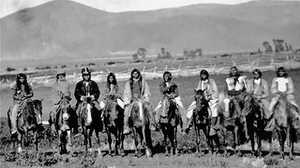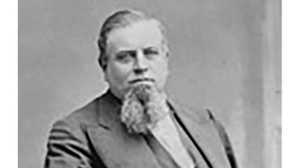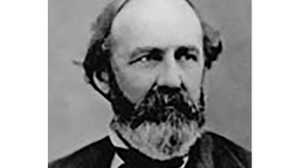Leland Stanford
Much like his future partners, Leland Stanford remade himself in gold rush California as a shopkeeper. In 1852, fed up with lawyering, he left the Midwest to become a partner in a wholesale grocery business founded by his brothers. By 1860 the Sacramento store was booming, and Stanford had become its sole proprietor. He had also formed a tight bond with Collis Huntington. Mark Hopkins, and Edwin and Charles Crocker through Sacramento's new Republican party, which would soon nominate Stanford as its candidate for governor.
A Political Man
To the casual observer he might have seemed an interesting choice. Slow to speak, a deliberate thinker, Stanford was characterized by a plodding nature that repeatedly vexed his railroad partners. However, he relished public life, and it was in this capacity that he best served the Central Pacific. As the board of directors took form in 1860, Stanford headed east to lobby for the venture and gain partisan support for his gubernatorial bid. Among Stanford's contacts was president-elect and fellow Republican Abraham Lincoln. Upon Stanford's return to Sacramento in summer 1861, the directors met to name officers. Stanford appointed Theodore Judah and Doc Strong as nominating committee, and, perhaps swayed by his political gravity, they in turn named Stanford president. It was a slight to company mastermind Huntington, who had to settle for vice president -- and the beginning of bad blood that estranged him from Stanford and drove Judah away from the Central Pacific.
Railroad President
On January 8, 1863, Governor Stanford broke ground to inaugurate the Central Pacific's construction. Crowds cheered him that day, but bad choices cost Stanford his governor's office by the end of his first term. Characteristic was his May decision to appoint business partner E. B. Crocker to the California Supreme Court. It was a temporary appointment containing no real conflict of interest, but it looked bad, and caused the governor to lose ground among supporters. Political position had allowed him to funnel state money to the railroad; free from the responsibilities of office, Stanford turned his full attention to railroad duties. However, the president seemed to have trouble motivating himself, leaving the exhausting tasks to his compatriots. When he made decisions on their behalf, the results often sent the Associates scrambling. In 1868 he signed a million-dollar draft without their consultation, making the company captive to the Bank of California. It sent Hopkins into a tailspin. "If it didn't suit Governor Stanford's lazy way as a good fellow doing a large business with clever fellows in a clever manner, it would please me very much better," he complained to Huntington.
Emissary to the Mormons
Stanford proved of use to the company in the Utah, where he acted as emissary to the Mormons and kept an eye on the competing Union Pacific. In early 1868, as the Central Pacific pushed out of the mountains, the Associates feared they had made a mistake by not keeping a delegate in the camp of Brigham Young. Stanford, the diplomat among them, seemed the person to send. By August of that year he had reached an agreement with Young providing Mormon laborers for Central Pacific grading work.
Frustrating Partner
Stanford's characteristic silence and reticent pace repeatedly tried his partners' patience. "We have not heard from Stanford in ten days," Charles Crocker fumed to Huntington. "Don't know what he is doing. I guess nothing -- in fact I never knew him to do much himself -- he is awful lazy & never attends to details -- wants somebody to come along afterward & stop the leaks & do the work." What reconnaissance he did report further harried them. His correspondence contained hare-brained schemes for piercing the canyons and ever-changing speculations of the line's potential location that frustrated the Associates' land-grabbing designs. However, Stanford's partners were sometimes too quick to anger at his work. Stanford's appraisal of Union Pacific's rapid progress, though frustrating, was accurate, as he later by proved to Huntington by escorting him across Utah Territory to see for himself.
A Lasting Legacy
To his colleagues, Stanford's partnership was a source of constant consternation; to Huntington, his role as figurehead a plain insult. Tensions continued to mount after the successes of 1869, as Stanford repeatedly dipped into company holdings to fund construction of palatial homes and the chartering of a private institution. Huntington derided the latter project as "the circus." But Leland Stanford Junior University, named in honor of the cherished son Stanford lost to typhoid in 1884, ensured the most famous of the Big Five a legacy that long outlasted those of his Associates.







